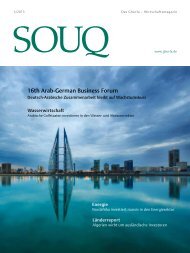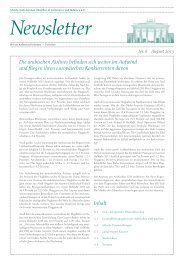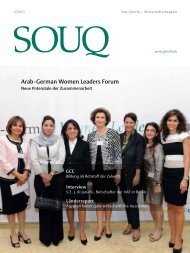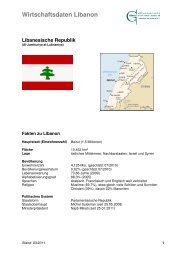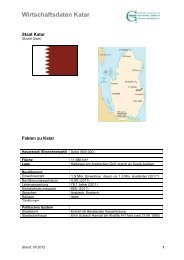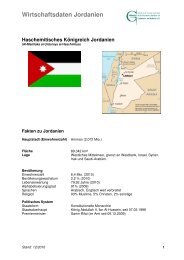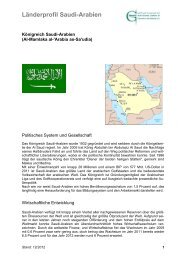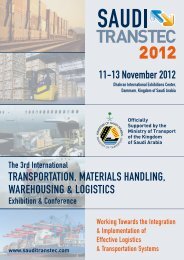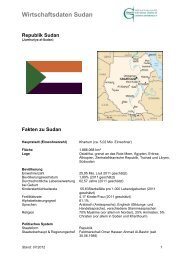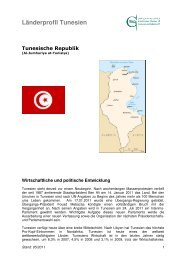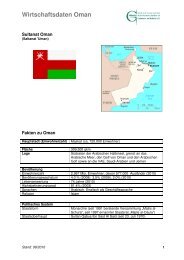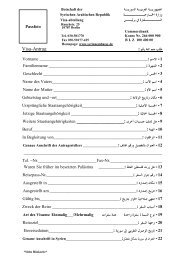Saudi-Arabien Wirtschaftshandbuch Saudi Arabia Business ... - Ghorfa
Saudi-Arabien Wirtschaftshandbuch Saudi Arabia Business ... - Ghorfa
Saudi-Arabien Wirtschaftshandbuch Saudi Arabia Business ... - Ghorfa
Erfolgreiche ePaper selbst erstellen
Machen Sie aus Ihren PDF Publikationen ein blätterbares Flipbook mit unserer einzigartigen Google optimierten e-Paper Software.
to enter into negotiations about signing this agreement.<br />
It remains to be seen what actually happens here. At the<br />
same time, an important preference has been eliminated<br />
in the new procurement law: The preference for awarding<br />
orders to companies that are purely owned by <strong>Saudi</strong>s no<br />
longer applies. Article 3 of the law stipulates that domestic<br />
and foreign bidders need to be treated equally.<br />
However there is still a provision in the new version of<br />
Article 5 of the law and Article 2 of the Implementation<br />
regulations that states that public procurement of <strong>Saudi</strong><br />
products and services and products of those states that<br />
have been placed on a national par with <strong>Saudi</strong> <strong>Arabia</strong><br />
should be preferred over foreign products.<br />
Another area is the commitment of foreign contractors to<br />
include local companies in the project execution process.<br />
Foreign companies and <strong>Saudi</strong> companies completely or<br />
primarily funded with foreign capital also fall under the<br />
so-called 30% ruling.<br />
These kind of companies have a duty to sub-contract 30%<br />
of the order value to companies that are purely owned by<br />
<strong>Saudi</strong>s. The 30% ruling also applies to local companies,<br />
whose foreign interest level is 50% or more. Vice versa,<br />
this means that local companies with a minimum foreign<br />
investment interest are not affected by the 30% ruling.<br />
Presence for executing the project<br />
If the actual presence of the company is required in <strong>Saudi</strong><br />
<strong>Arabia</strong> to execute the project, the foreign companies need<br />
to establish a legal presence in the country in line with<br />
the investment law. This can either be a limited company<br />
as defined by <strong>Saudi</strong> law or a dependent branch office. In<br />
some cases, a temporary licence, which used to be fairly<br />
common and was issued exclusively by the <strong>Saudi</strong> Ministry<br />
of Trade, may be used. The temporary licence was issued<br />
for specific projects for contracts for the <strong>Saudi</strong> public authorities<br />
and expired immediately on completion of the<br />
respective project. Today, all licences are only issued by<br />
SAGIA as the responsible public authority.<br />
Sometimes certain activities are not subject to licensing as<br />
a subsidiary, e.g. in the case of advisory professions such<br />
as consulting companies. In this case, other project execution<br />
forms need to be found such as e.g. joint ventures with<br />
a local partner etc.<br />
Tax issues need to be looked at carefully here to check the<br />
tax burden when realising state orders within <strong>Saudi</strong> <strong>Arabia</strong>.<br />
For more information see the following chapter.<br />
––––––––––––––––––––––––––––––––––<br />
STeuerrechT<br />
Das saudische Steuerrecht unterscheidet zwischen Steuern<br />
auf der einen Seite und Zakat auf der anderen Seite.<br />
Ausländische Unternehmen müssen Körperschaftssteuer<br />
abführen, während saudische Staatsbürger und<br />
Unternehmen, soweit sie in saudischem Eigentum stehen,<br />
Zakat leisten müssen. Zuständig ist die zentrale<br />
saudische Steuerbehörde, das Department for Zakat<br />
and Income Tax. Während die Körperschaftssteuer<br />
<strong>Saudi</strong>-<strong>Arabien</strong>s eine Gewinnbesteuerung darstellt, wird<br />
bei der Zakat vom Grundsatz her 2% des verfügbaren<br />
Arbeitskapitals abgeführt. Wirtschaftlich führt dies zu<br />
einer ungefähr gleichen Belastung des Steuer- bzw. Zakatzahlers.<br />
Am 1.8.2004 trat in <strong>Saudi</strong>-<strong>Arabien</strong> ein neues Steuergesetz<br />
in Kraft. (Königliches Dekret Nr. M/1 vom<br />
15.1.1425H (6.3.2004)), das die Besteuerung von<br />
ausländischen Personen, nämlich natürlichen und juristischen<br />
Personen regelt.<br />
Steuerpflichtige<br />
Steuerpflichtig sind<br />
rechTliche rAhMenBeDinGunGen – – underlyInG leGAl condItIonS<br />
– Kapitalgesellschaften mit Sitz in <strong>Saudi</strong>-<strong>Arabien</strong>,<br />
abhängig vom von Ausländern gehaltenen<br />
Gesellschaftsanteil;<br />
– Natürliche ausländische Personen, die ihren<br />
Wohnsitz in <strong>Saudi</strong>-<strong>Arabien</strong> haben und einer<br />
Geschäftstätigkeit nachgehen;<br />
– Personen, die nicht ihren Wohnsitz in <strong>Saudi</strong>-<br />
<strong>Arabien</strong> haben, aber einer Geschäftstätigkeit über<br />
eine in <strong>Saudi</strong>-<strong>Arabien</strong> befindliche Betriebsstätte<br />
nachgehen;<br />
– Personen ohne Wohnsitz in <strong>Saudi</strong>-<strong>Arabien</strong>, die aber<br />
Einkünfte aus <strong>Saudi</strong>-<strong>Arabien</strong> erzielen;<br />
– Personen, die im Bereich der nationalen Gas-<br />
Investitionen tätig sind;<br />
– Personen, die im Bereich der saudischen Erdölwirtschaft<br />
tätig sind.<br />
Wichtig sind in diesem Zusammenhang die Definitionen<br />
des Wohnsitzes und der Betriebstätte, wobei ein<br />
Wohnsitz bei natürlichen Personen angenommen wird,<br />
wenn diese mehr als 183 Tage pro Jahr im Inland anwesend<br />
sind. Über die Definition der Betriebsstätte wird<br />
das Einkommen von in <strong>Saudi</strong>-<strong>Arabien</strong> tätigen ausländischen<br />
Angestellten von der Steuerpflicht ausgenom-<br />
133



